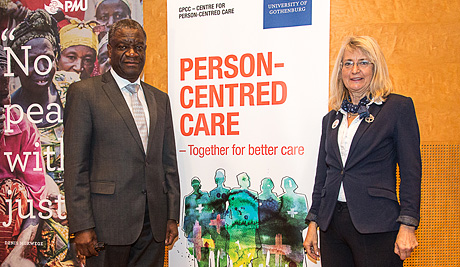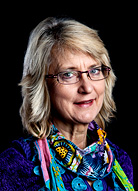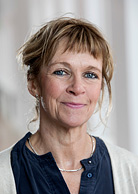 Nobel Laureate Denis Mukwege and Professor Marie Berg at the Sahlgrenska Academy have a long-standing medical cooperation. Here photographed in connection with a seminar at the University of Gothenburg. Photo: Liss Persson.
Nobel Laureate Denis Mukwege and Professor Marie Berg at the Sahlgrenska Academy have a long-standing medical cooperation. Here photographed in connection with a seminar at the University of Gothenburg. Photo: Liss Persson.
The awarding of the Nobel Peace Prize to Dr Denis Mukwege and Yazidi activist Nadia Murad sends an important signal.
‘It symbolises and brings attention to the importance of persistent efforts to end the use of sexual violence in wars and armed conflicts,’ says Helena Lindholm, professor of peace and development research at the University of Gothenburg.
Dr Mukwege has spent a large part of his life helping victims of sexual violence in DR Congo. His university hospital, the Panzi Hospital, was established in Bukavu in 1999 and has treated thousands of girls and women who have fallen victim to such violations.
 ‘Finally!’ says Marie Berg, professor of health care sciences and long-time colleague of Dr Mukwege.
‘Finally!’ says Marie Berg, professor of health care sciences and long-time colleague of Dr Mukwege.
‘It’s so important to bring attention to the work against sexual violence, which is used as a weapon in armed conflicts and unfortunately is very effective,’ she says.
Long-term medical cooperation
Professor Berg has worked together with Dr Mukwege for several decades. Among their many joint projects, Berg and Mukwege have documented a person-centred care model for women and girls who had been exposed to sexual violence. This specific care is carried out in collaboration between the Panzi Hospital and the Panzi Foundation, a foundation created to provide more than health care; a combined overall care with a person-centred focus.
‘Our first priority was medical treatment, but we soon realised that it wasn’t enough. We needed a broader perspective,’ said Dr Mukwege at a well-attended seminar held when he visited the University of Gothenburg in 2016.
The central idea of their model is to focus the work on four different areas, namely the women’s medical, psychosocial, legal and socioeconomic needs. In addition, the women’s individual resources are identified and used actively in the rehabilitation of their lives and the communities they live in.
‘Even though DR Congo is a democracy, the regime continues to delay democratic elections. When Dr Mukwege has spoken at the United Nations, Congo’s seat has been empty. He has not been supported by his country’s leaders. The fact that he has now been awarded the Nobel Peace Prize is great news for the future of the Democratic Republic of Congo,’ says Berg.
A horrible suffering brought to attention
The other winner of the prize, Nadia Murad, has personal experience of war crimes. In 2014, she was captured by ISIS in her home town of Kocho in northern Iraq and then used as a sex slave. After three months, she managed to escape and tell the world what she had gone through. In 2016, at age 23, Murad was named the UN’s first Goodwill Ambassador for the Dignity of Survivors of Human Trafficking.
‘Nadia Murad has brought attention to an often neglected situation of incomprehensible suffering among for example Yezidi girls and women, as victims of horrible violations by Da’esh, or the Islamic State in Iraq and Syria. Murad has witnessed and listened to other women’s testimonies,’ says Lindholm.
Praised for their courage
The Nobel Foundation notes that both Nadia Murad and Denis Mukwege have risked their personal safety by bravely working against war crimes and seeking justice for victims. In this way, they have also contributed to cooperation and partnerships among countries through the application of international legal principles.
 ‘Mukwege and Murad sharing the prize draws attention to the human rights violations associated with these crimes, and it sends a clear signal that this is an issue of global importance. The use of sexual violence, slavery and other violations in armed conflicts is both a historic and a current phenomenon and calls for an intensification of international interventions. The selection of Mukwege and Murad for the Nobel Peace Prize was very appropriate,’ says Professor Lindholm.
‘Mukwege and Murad sharing the prize draws attention to the human rights violations associated with these crimes, and it sends a clear signal that this is an issue of global importance. The use of sexual violence, slavery and other violations in armed conflicts is both a historic and a current phenomenon and calls for an intensification of international interventions. The selection of Mukwege and Murad for the Nobel Peace Prize was very appropriate,’ says Professor Lindholm.
Portrait photos by: Johan Wingborg
Read more about the Nobel Peace Prize 2018

 ‘Finally!’ says Marie Berg, professor of health care sciences and long-time colleague of Dr Mukwege.
‘Finally!’ says Marie Berg, professor of health care sciences and long-time colleague of Dr Mukwege. ‘Mukwege and Murad sharing the prize draws attention to the human rights violations associated with these crimes, and it sends a clear signal that this is an issue of global importance. The use of sexual violence, slavery and other violations in armed conflicts is both a historic and a current phenomenon and calls for an intensification of international interventions. The selection of Mukwege and Murad for the Nobel Peace Prize was very appropriate,’ says Professor Lindholm.
‘Mukwege and Murad sharing the prize draws attention to the human rights violations associated with these crimes, and it sends a clear signal that this is an issue of global importance. The use of sexual violence, slavery and other violations in armed conflicts is both a historic and a current phenomenon and calls for an intensification of international interventions. The selection of Mukwege and Murad for the Nobel Peace Prize was very appropriate,’ says Professor Lindholm.